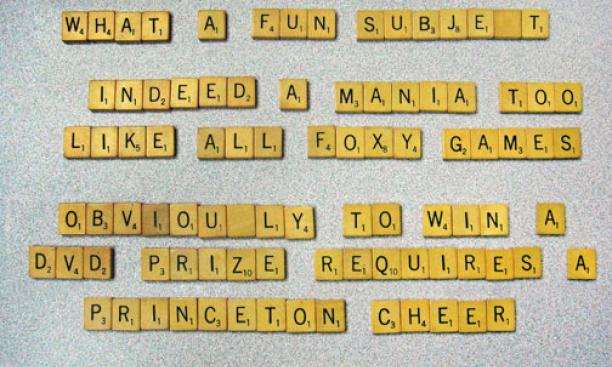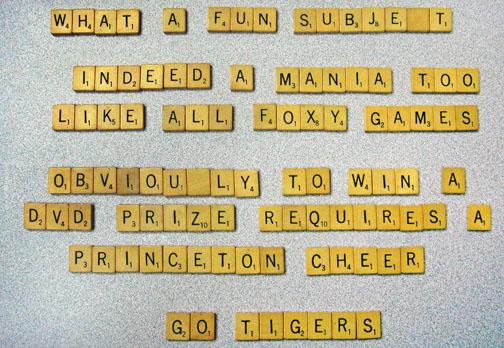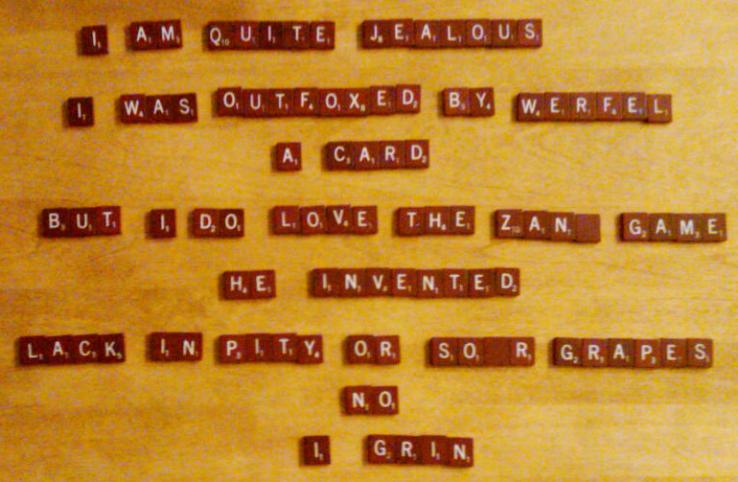


Justin Werfel ’99 is a man of many talents.
He spends his days as a scientist in “bioinspired robotics” at the Wyss Institute for Biologically Inspired Engineering at Harvard. At Princeton, he was a juggler and a member of the University Band. And now he adds another accomplishment of the off-hours variety: He’s the winner of PAW’s wordplay contest.
A panel of judges — Professor Joshua Katz and three of his students, Lily Akerman ’13, Michael Newman ’13, and Kristin Cordwell ’13 — deemed Werfel’s entry the best of a dozen samples of constrained writing submitted by PAW readers. For his winning efforts, he received three DVDs related to wordplay.
Constrained writing is a literary form in which a restriction is placed on word choice: rhyme, meter, the requirement that words begin with the same letter or the banning of a letter — the options are nearly endless. A Feb. 3 PAW article described Katz’s freshman seminar on wordplay, and included students’ examples of constrained writing. Alumni were invited to try it themselves.
In PAW’s contest, readers could choose their own constraint. For example, Sally Van Doren ’84 submitted a poem that omitted the letter “e.” Several alumni sent palindromes. Yana Kane-Esrig ’85 and N. Pike Johnson ’59 contributed entries in which all the words began with the same letters, while David Forrest ’60 wrote a poem in which all the words contained double consonants.
The merits of these and other entries notwithstanding, the judges were unanimous in choosing Werfel’s submission as the winner.
As his constraint, Werfel chose a standard Scrabble set, in which each tile could be used exactly once. He came up with this:
What a fun subject! Indeed, a mania, too, like all foxy games. (Obviously, to win a DVD prize requires a Princeton cheer: Go Tigers!)
Newman pointed out that a standard Scrabble set has only two “c” tiles and four “s” tiles, while the entry has one more of each. But he surmised correctly that Werfel was using the two blank tiles to represent the extra “c” and “s.”
The judges applauded Werfel’s entry because its constraint was not particularly obvious, it had a Princeton connection, was appropriate and difficult, and included the word “foxy” — a word that had a prominent place in the original PAW article.
Werfel had put his entry together — using an actual Scrabble set — one morning before work, after he’d spent a day or two “vaguely kicking around ideas.” Though he had encountered constrained writing only a few times in the past, he has long enjoyed wordplay. “The appeal is like that of a good puzzle,” he said. “It’s easy to appreciate the craft in it, and there’s an elegance in the way things fall into place.”
Ambigram
By Tom Reed *71
(Upside down, it reads the same.)

Alphabetical Soup
By Arlen Kassof Hastings ’80
Appetizing broth, cooking delectably, emanating flavor, greets her in Jespersen’s kitchen. Letters made neatly of pasta quickly revitalize Sara, the unhappy vegetarian whose xeric yam ziti a belligerent carnivore didn’t eat, favoring goose.
Having inauspiciously jeopardized Kevin’s (lately mentioned nasty omnivore’s) palate, quiet, remorseful Sara took up violent wailing. “Xantippe! Yucky ziti!” angrily barked churlish diner, eying foie gras. “How I jubilantly kill living meat! Nothing outdoes poached quail. Rabbit stew tastes unbelievable. Venison’s wonderful. Xiphias — yum! Zebra’s absolutely breathtaking. Cat’s delicious, especially fried.”
Greatly horrified, inexpressibly jolted kitten lover moderates nonetheless: “Ooh, poor queasy rascal.” She then uses Vedic wisdom. “Xylophones! Yahweh’s zithers!” Accompanying Brahmin choir, dinner eating forgotten, go harmoniously, invoking joyful karma, latterly mortal nemeses. One particularly quixotic religious song tells us verily why xanthism — yellowish zoological aberration — begets color, dyeing egrets’ feathers. “Gosh!” humbly intones jittery Kevin, liking music. “Now obnoxiously plucking quills really seems terrible.”
Ultimately, vegetarianism wins. Xenogogue yells, “Zounds!”
Arlen Kassof Hastings ’80 works on fostering science in developing countries as the executive director of the Science Initiative Group at the Institute for Advanced Study. She chairs the Community Service Committee of the Princeton Area Alumni Association and occasionally finishes a New York Times Saturday crossword puzzle. After reading about Justin Werfel '99s winning entry, she submitted the following response to PAW with the explanation: "This is addictive."

